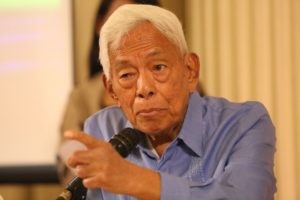MANILA, Philippines – The Philippine National Police (PNP) said Monday it leaves the decision to Congress on whether or not to separate the unit probing rogue cops from the organization.
Lt. Gen. Archie Gamboa, officer-in-charge of the PNP, said that the decision on the matter would be up to legislators but added that for PNP and Interior Secretary Eduardo Año, the Internal Affairs Service (IAS) investigating police officers “can still function.”
“When the law creating the IAS was created, the legislative branch of government have their own purpose. Let us not overreact on situations. Remember, ang batas dapat mayroong (the law should have) stability. So kung kami ang tatanungin (if we will be asked), we leave it up for Congress if they want to amend that,” Gamboa said in a press briefing at Camp Crame.
READ: Senate joint panel suggests IAS be separated from PNP
During the presentation of the Senate blue ribbon and justice and human rights committee’s findings on its probe on the so-called “ninja cops,” Senator Richard Gordon proposed that IAS should not be under the jurisdiction of PNP to avoid giving favors to erring police officers.
Gamboa said PNP is currently studying the request of IAS for adjudicatory powers and financial independence.
“Although under the law, under talaga sila sa (it is really under the jurisdiction of the) Chief, PNP,” he said.
IAS director Atty. Alfegar Triambulo earlier explained that he wants the unit to be independent of PNP as in the case of its foreign counterparts, which are feared by scalawag policemen since it is disassociated with the police organization.
According to Gamboa, IAS is only one of the seven entities that “discipline” personnel of the PNP, which include the Ombudsman, the National Police Commission, and the People’s Law Enforcement Board.
“Kaya ‘yun ang gusto namin hilingin din na kung pwede i-limit sana ito. Paminsan-minsan nagkakasabay-sabay ‘yung kaso ng PNP kasi ang daming quasi-judicial bodies kung saan puwede ka magcharge ng PNP [personnel],” he said.
(That’s what we want to ask also, for this to be limited. Sometimes cases against the PNP pile up because of many quasi-judicial bodies where you can charge a PNP [personnel].)
RELATED STORY


